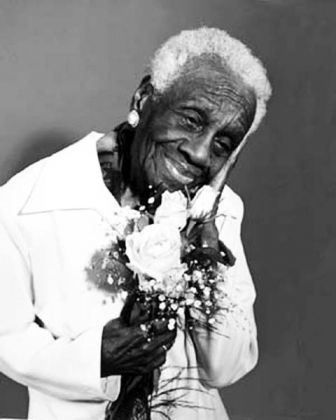
Meet the Presses: Ruth Ellis, Detroit printer and Black LGBTQ icon
Meet the Presses: Ruth Ellis, Detroit printer and Black LGBTQ icon
In our Meet the Presses series, we highlight the pioneering women in print that we’ve named our beloved letterpress machines after. These women have shown us that with perseverance and bravery, it’s possible to not only achieve one’s goals, but to also have a large impact on this world. Every day in our studio, when we look at our letterpress machines, we thank these bold women who paved the way for printers like us.

In the last year of the 19th century, when the majority of Americans did not have electricity or toilets in their home, a baby girl named Ruth Ellis was born in the state capitol of Illinois. She was the only daughter of former slave and the first Black mail carrier of Illinois, Charles Ellis Sr., and his wife, Carrie Farro Ellis. Carrie passed away when her daughter was just 12 years old, leaving Ruth to be raised by three brothers and her father. Through Ruth grew up in an integrated neighborhood of Springfield, her family experienced racism, specifically Charles was the target of derogatory attacks from his fellow mail carriers and the local press.
Being gay was still illegal in the beginning of the 20th century, and the discussion and acceptance of lesbianism was barely in its infancy, which makes young Ruth’s understanding that she was attracted to women at a young age all the more remarkable. At the age of 15, she developed a crush on her female gym teacher and invited girlfriends over to the house. In interviews, Ruth said she never had to formally come out to her father and brothers, and they accepted her for who she was.
Ruth’s life in the 1920s is not widely written about, but it is most likely around this time that she began working at a print shop in Springfield. At the Black-owned I.E. Foster & Co., she learned how to print and typeset. By the 1930s, she met her future long-term partner, Ceciline “Babe” Franklin. Babe was ten years younger than the thirty-something Ruth, and she “almost shut the door in [Babe’s] face.” But when Ruth decided to move to the bustling city of Detroit, Babe moved too.
In Detroit, Ruth first made income looking after a small child, while Babe worked as a cook. But soon she landed a gig at the Detroit print house Waterfield & Heath, where she printed for almost 10 years. When her doctor brother Henry passed away, she was given a large sum of money that went towards opening a print shop in the first floor of her home with Babe. She named it Ellis & Franklin Printing Co.
Ruth was the first woman to have a print shop in the state of Michigan, and she kept busy printing stationery, posters, and raffle tickets for churches. Ruth was a God-fearing woman who enjoyed spending time at her church, while Babe liked to “drink, go to bars, and gamble.” Ruth said that while she wasn’t sure if she truly loved Babe, their 30-year relationship was successful because “opposites attract.”
In addition to their home being a print shop, the couple also opened their doors to Black LGBTQ individuals who did not feel welcomed in public spaces. For over 20 years, “The Gay Spot” was a place where gay and lesbian youth could be free of discrimination and stigma, and sing, dance, and socialize with friends in a safe community. Ruth financially supported some of these kindred souls, even paying for a college tuition or two. According to The Legacy Project of Chicago, a nonprofit that shares the stories and accomplishments of LGBTQ individuals, Ruth was an advocate for the senior citizen community, in addition to the Black and LGBTQ communities, and proposed a lesbian version of Big Brothers/Big Sisters for young and senior lesbians.

By the 1960s, Ruth and Babe were forced to leave their home due to gentrification, and the two parted ways. They stayed in close contact until Babe passed away from a heart attack in 1975. Around this time, Ruth became acquainted with the lesbian feminist movement in Detroit and was invited to attend marches and speak at events. She remained active in the community—bowling, traveling, dancing and photography were her favorite hobbies—all the way until the day she died at the age of 101.
When Ruth turned 100, she was honored with a documentary on her life—Living with Pride: Ruth C. Ellis @ 100—and was sought after for interviews from Oprah and major publications. One month before she left this earth, she was able to attend the opening of a building named after her, a place where homeless LGBTQ youth in Detroit can find emotional support and medical and mental health care. “It amazes me to think that little ol’ Ruth Ellis has come this far,” she said. “I don’t know how it happened. It’s been a miracle to me to see my name on a building, the Ruth Ellis Center, that’s taking care of young people.”
We honor you, Ruth, for your bravery, your talent, your generosity, and your lasting impact on the community.
–
About the machine: Ruth is a 10x15 Kluge M series built in 1946.
